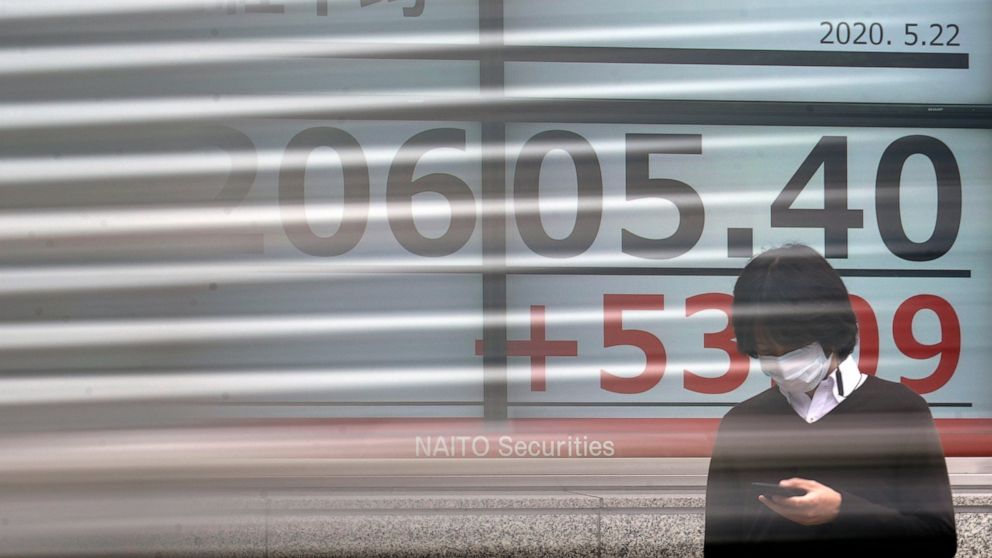Wall Street heads lower, but still on track for weekly gain
Stocks are headed lower on Wall Street following a mixed showing in overseas markets
By
ALEX VEIGA AP Business Writer
May 22, 2020, 4:38 PM
4 min read
4 min read
BANGKOK — Stocks moved lower on Wall Street Friday, adding to losses from a day earlier, as the market closed out a choppy week ahead of a long holiday weekend in the U.S.
The S&P 500 was down 0.3% in midday trading, but was on track for a weekly gain. Energy stocks fell the most as crude oil prices headed lower after six straight gains. Losses in banks, industrial stocks and companies that rely on consumer spending outweighed gains elsewhere in the market. Bond yields were mixed.
Given the market’s solid gains this week, some investors were likely taking the opportunity to pocket some profits, said Mike Zigmont, head of trading and research at Harvest Volatility Management.
“Maybe before a three-day weekend you take some risk off the table and that leads to some downward pressure on the stock market,” he said.
The Dow Jones Industrial Average dropped 118 points, or 0.5%, to 24,354. The Nasdaq composite was down 0.1%. Small company stocks, the biggest gainers so far this month, also lost some ground, sending the Russell 2000 down 0.5%. U.S. stock markets will be closed Monday for the Memorial Day holiday.
The selling on Wall Street followed downbeat trading in Asia. Hong Kong’s main index dropped 5.6% after China made more moves to limit political opposition in the former British colony. Beijing also abandoned its longstanding practice of setting economic growth targets. European markets shook off some early weakness and were mostly mixed.
The S&P 500 is on track to end the week with a big enough gain to make up for all of its losses from last week, thanks largely to a strong rally on Monday that reversed all of the benchmark index’s losses for the month. The index is still down about 13% from its all-time high in February.
Fresh hopes for a U.S. economic recovery in the second half of the year and optimism about a potential vaccine for COVID-19 helped spur stocks higher much of the week. Investors are betting that the economy and corporate profits will begin to recover from the coronavirus pandemic as the U.S. and countries around the world slowly open up again.
Traders remain wary, however, that the reopening of businesses could lead to another surge in infections, potentially hobbling efforts to get the nation’s battered economy growing again.
Foot Locker slid 11.5% after the athletic footwear and apparel retailer reported quarterly results that fell well short of Wall Street’s forecasts. Deere & Co. fared somewhat better, gaining 2% after posting quarterly results that topped analysts’ estimates.
Oil prices fell, on track to snap a six-day winning streak. Benchmark U.S. crude oil was down 3.6% to $32.70 a barrel. Brent crude oil, the international standard, was off 3.9% to $34.64 a barrel.
Crude oil started the year at about $60 a barrel, but plummeted earlier this year as demand sank due to widespread travel and business shutdowns related to the coronavirus. The price has risen this month as oil producing nations cut back on output and the gradual reopening of economies around the globe have driven up demand.
Bonds yields were mixed. The yield on the 10-year Treasury note, a benchmark for interest rates on many consumer loans, fell to 0.65% from 0.67% late Thursday.
Germany’s DAX rose 0.4%, while the CAC 40 in Paris added 0.4%. Britain’s FTSE 100 fell 0.5%.
Beijing’s move to take over long-stalled efforts to enact national security legislation in semi-autonomous Hong Kong spooked investors in Asian markets who have endured months of pro-democracy demonstrations last year that at times descended into violence between police and protesters.
The proposed bill is aimed at forbidding secessionist and subversive activity, as well as foreign interference and terrorism. Such proposals are certain to be approved by the largely ceremonial parliament.
The move has drawn strong rebukes from the U.S. government and rights groups.
![]()


